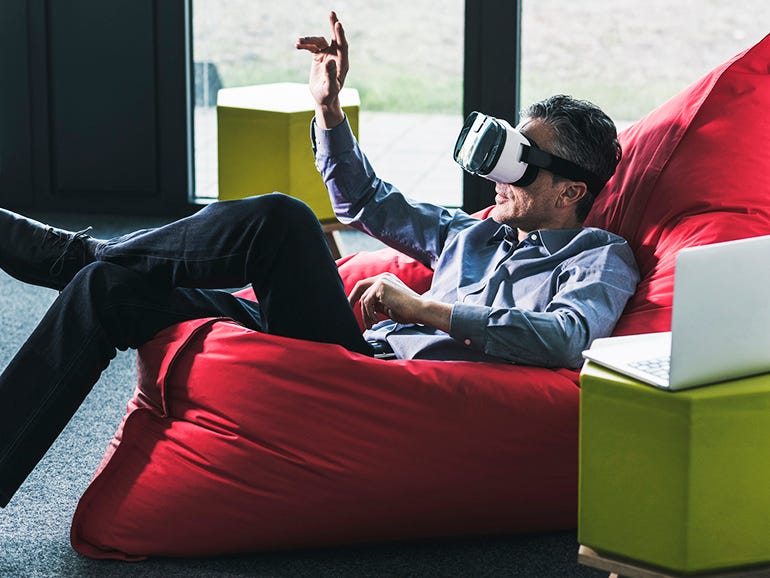
Rather than sit at a desk, Paul Tomlinson slips on a headset and spends as much as 40 or 50 hours a week working with a view of the Earth from space, with different panes open for coding, messaging and Spotify. Or maybe he’ll overlook a tropical lagoon and plough through his email.
While the rest of us labor away with a view of our deskmate slurping coffee, he will attend meetings around a campfire or on top of a submarine. That’s because Tomlinson has been spending much of his working day – his working week – in virtual reality (VR) for years now.
Although he had been using VR for entertainment purposes since 2014, by 2019 he saw he could use it for work too – and he jumped at the chance.
“Inside of a week, I cleared off my entire desk, got rid of all the monitors and clutter, and just had my input system, peripherals, a beverage, and a box for my cat,” he says. “All I have now is a chair and a keyboard.”
For Tomlinson, and an increasing number of other professionals, working in VR has proven to benefit their workflow and productivity.
“For me it’s very freeing. I can resize, reposition, add, or remove as much screen space as I need. I don’t have to squint or lean in, crane my neck, hunt for an application window I just had open, or struggle to find a place for something,” says Tomlinson who wrote about his experience of working in VR in a blog that went viral called Working from Orbit.
Tomlinson currently works two-to-three days a week strictly inside the virtual world in his Oculus Quest 2 headset. He said it has improved his focus and productivity because he gets to compartmentalize a physically separate space in which to work that limits distractions and gets him in the zone using different VR apps like Immersed, Spatial, Horizon Workrooms, Noda, and more.
In addition, VR provides him with new capabilities that are impossible to replicate in the real world.
“Your whiteboarding space can be infinite and include objects and pictures and things well beyond just grabbing a marker. You can scale things up and down – you can even scale yourself,” he said. “You can change the entire venue to have a meeting around a campfire or on top of a submarine.”
Tomlinson is one of the more than 1,400 members of the XR4Work Facebook Group, a community of people who share tips, experiences, and industry news about working in the VR world.
The group’s co-creator, Rick Casteel, said the members span a wide range of industries, including writers, developers, realtors, automotive designers, and more, who all use VR in their daily work.
Casteel said one particular use case he’s seen more and more is using VR for onboarding, giving the example of an airline that uses virtual reality to train new recruits.
Especially when it comes to onboarding remote employees, VR just makes sense. According to one case study from Nestle Purina, the company saved $100,000 a year in travel and lost-productivity costs by training 10 salespeople per month in VR. Another study from PwC found that VR courses helped employees train up to four times faster than traditional methods. Other companies that have utilized VR include DHL, Johnson-Johnson, Hilton, and others.
Of course, working inside a virtual world isn’t for everyone, and Casteel said it would take some time and some improvements in the space before critical masses adopt it.
“We’re still a little bit in the Gold Rush era of this industry,” he says. “Once you start challenging people to take what they’ve been doing on a flat screen for so long and do it in 3D, it’s a different way of thinking and working, and that’s going to take some transition time.”
Even when Tomlinson first started working in VR daily, he said there were some hurdles to overcome; earlier versions were fiddly to use and the headsets would get too uncomfortably hot without a desk fan to cool them.
“Right now, if you’re going to work in these environments, it’s work to do the work,” Casteel says. “There are all these kinds of rough edges.”
However, Tomlinson says that as the VR technology is getting better, so is the experience. But to truly reach the masses, he said there needs to be some improvements to both the hardware and software.
“The technology is moving in the right direction, but it will take a while,” he says. “We need better displays that need to be more like putting on a pair of glasses. It’s got to be convenient, comfortable, and persistent.”
And while working in VR isn’t the future of work for everyone, it might be the future of some types of working environments and professions. Tomlinson argues that VR will be commonplace in the workplace in five years, especially as part of the shift to remote work.
“It shouldn’t replace human or physical connection, but I would see this replacing travel for future meetings and business functions at work,” he argues.
Casteel encourages those curious to pick up a headset to see for themselves if you can benefit from working in VR.
“I put that headset on, and suddenly I’m sitting atop a starship above Earth, on a beach, or on top of a mountain. And, you know, it may seem a bit cartoony. But after you use VR for a while, you give your mind over to it,” Casteel says.
“You really buy into it, and you begin to hear the hum of the spaceship. I can look to my right and see the Earth spinning. I am alone and isolated in this space with this material that I’m working on – I think it’s best.”























